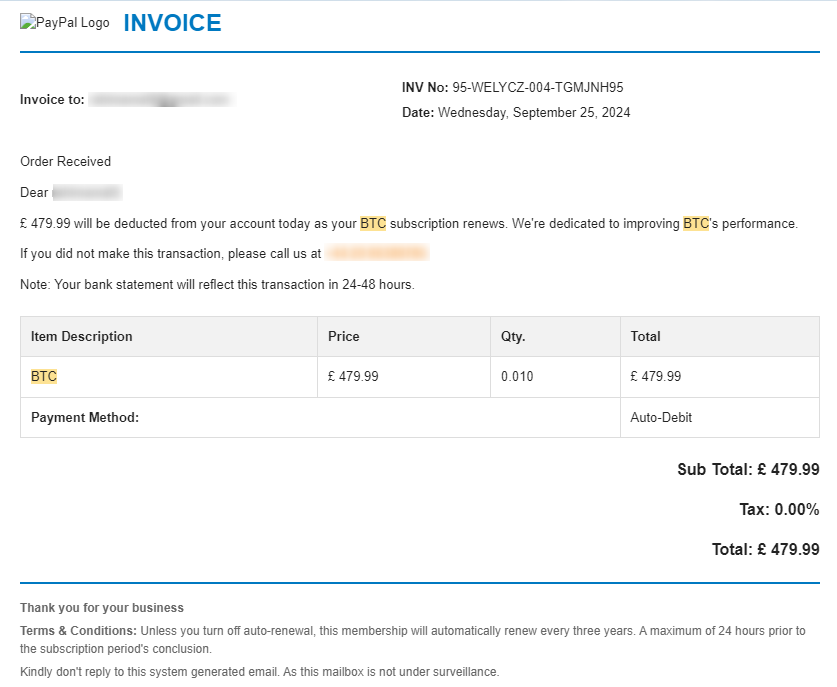I remember the excitement of seeing my very first Bitcoin ATM in our local mall. Cryptocurrency was taking off, particularly Bitcoin and Ethereum. But with that rise, so have crypto scams—and no one is immune.
Cryptocurrency Phishing Scams
Americans lost $5.6 billion last year in crypto fraud scams, the FBI said in a report, and that number is not dying down any time soon. One reason for this is that crypto transactions are often irreversible and difficult to track, giving scammers a huge advantage. One of the most common techniques to deploy crypto scams is via phishing.
A phishing message is a fraudulent text, email, or social media message designed to manipulate the victim into disclosing their sensitive information, such as login credentials, bank account information, and Social Security number. These messages often look professional and may include a logo, and usually ask you to click a link or verify your account on a fake website designed to capture your login credentials.
For phishing scams related to crypto, these messages may impersonate a legitimate crypto exchange, wallet provider, or even a crypto wallet you’re involved with for the goal of stealing your crypto funds. It’s so common that it took no more than a couple of seconds to find a phishing email relating to crypto in my inbox:
The above email is a fraudulent invoice impersonating PayPal. It is designed to spook you into calling the contact number, so the scammer can continue with the scam and get you to divulge your sensitive information.
To protect yourself from this crypto scam, be wary of urgent calls to action and check the sender’s email address. Scammers often have odd email addresses, including misspellings or variations of the name of the company they are impersonating.
You can also do a Google search for unfamiliar phone numbers to see if they belong to a legitimate company if you’ve noticed some
phishing warning signs.
Fraudulent Crypto Platforms
Scammers attempt to lure victims with enticing, once-in-a-lifetime, limited-time-only investment deals on fraudulent websites, to get them to either invest or transfer their crypto to a new platform. Some platforms may also impersonate legitimate crypto platforms to capture login credentials and gain access to crypto wallets.
If you’re suspicious of a potential crypto scam, search for the name of the domain followed by the term scam, to review potential reviews and complaints from other users. You can also search for the name of your country or state, followed by the term crypto scam tracker to search for any official crypto scam databases.
For example, if you’re in California, you can use the Department of Financial Protection & Innovation’s (DFPI) crypto scam tracker database. It can be a valuable resource for helping you protect yourself when engaging in crypto transactions.
Another way you can stay safe is to search for the domain on the Whois database, which can tell you the history of the domain, including when it was registered. Newly registered domains are often an indication of a scam.
Research is important, but trust your instincts. If it sounds too good to be true, it usually is.
Crypto Investment Scams
Scammers may even approach their victims as an “investment manager” on social media, email, or SMS, with an urgent request, promising a too-good-to-be-true return on investment. A common technique is to add you to a WhatsApp or Telegram group, making it look like an exclusive group used to discuss crypto investments. It’s common for a scammer to send fraudulent screenshots of how much money they supposedly made through a crypto investment.
The scammers may even appear to gift you some cryptocurrency to begin your initial investment with. They’ll assure you that you’ll make a profit, and on their website, it might look like your funds are growing—but it’s all an illusion. The goal is to convince you that everything is legitimate until you start investing a substantial amount. Once you try to withdraw your “profit”, the transaction fails, and you realize you’ve been scammed.
Some use fraudulent testimonials and inflated success rates to build trust, while others mimic legitimate platforms to deceive users into sharing personal information or funds.
To protect yourself from this crypto scam, be cautious about anyone contacting you about financial investments, and exit and report any suspicious Telegram or WhatsApp groups you get added to by unfamiliar contacts.
It’s important to watch out for unrealistic profit guarantees and pressure to invest quickly.
Crypto Blackmail Scams
This is a common low-effort scam where the scammer messages the victim, usually via email, claiming to have compromising photos and videos of the victim, and threatens to make them public unless they are paid in Bitcoin. They may even claim that they have hacked the victim’s computer. The truth is, it’s not a targeted email and the scammer doesn’t actually know the victim.
These types of emails are usually mass-sent to thousands of emails, and all the scammer has to do is wait to hear back from a spooked victim, where they’ll either send the funds to the scammer’s crypto wallet or try to reason with them.
The best defense against this is to avoid interacting with the scammer and delete the email. If you’re worried about getting hacked, you can read more about
cybersecurity tips to stay protected.
Crypto Giveaway Scams
Crypto giveaway scams are popular on social media, especially Twitter and YouTube. These scammers often impersonate celebrities or well-known influencers and may even use deepfake technology to create videos. They usually buy bots to leave comments to make giveaways appear legit through social proof. Some common methods include claiming to double your cryptocurrency investment or getting free crypto for doing a survey or signing up.
However, they may also pretend to give away a prize. The message usually includes instructions on how to participate in the giveaway, and the scammer will then contact the interested people privately asking for a small payment to cover “transaction fees.” Once any crypto is sent to a “giveaway” address, it is gone forever.
To stay safe, remember that almost all crypto giveaways are scams. For any legitimate giveaways, you’ll never be expected to pay. Whether for transaction fees, processing fees, or any other reason.
If you suspect that you’re a victim of a giveaway scam or notice suspicious activity on social media, report it immediately.
Scammers are constantly improving their tools and technologies, and there is no such thing as being completely secure when online. However, by questioning too-good-to-be-true offers and doing a bit of homework before diving in, we can protect ourselves from falling victim to their tricks. If you want to learn more about online scams, here’s seven of the common ones to watch out for.



